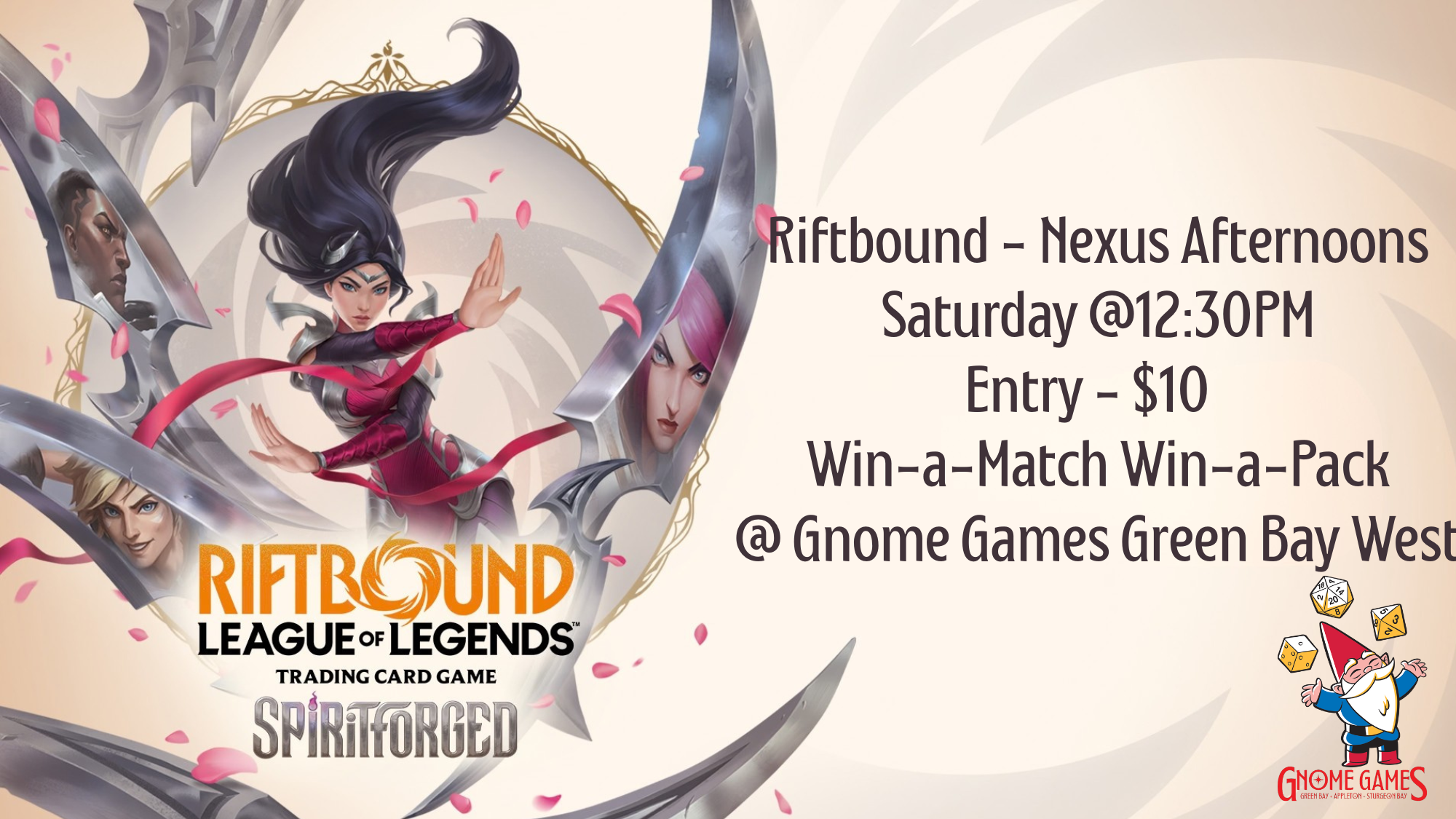
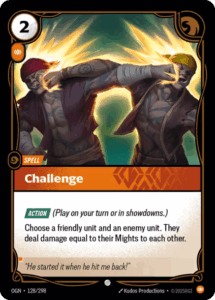 Join the Gnomes on Saturdays at 12:30pm for a Riftbound Nexus Tournament!
Join the Gnomes on Saturdays at 12:30pm for a Riftbound Nexus Tournament!
3 rounds of play, with Win-A-Match, Win-A-Pack prizing!
Each match will be best 2 of 3, 60 minute round.
This is a casual Local Constructed tournament with Swiss rounds!
Nexus Night promo packs will be awarded based on availability!
You may have a sideboard, following official rules:
- 601.1.c.1. A player’s sideboard can include 8 or fewer cards.
- 403.3. Limits on copies of named cards as defined by competition format apply to the combination of Main Deck and sideboard.
- 403.4. Players may use sideboard cards to modify their deck in between games of a match. Sideboard cards must be exchanged 1 for 1 with Main Deck cards.
- 403.4.a. During that time, a player may change their Chosen Champion to one from their sideboard or Main Deck that meets the deckbuilding rules of the competition format.
- 403.4.b. In constructed formats, a player may not change their Runes, Legend, or Battlefields at any point after deck registration.
- 403.4.c. After the sideboarding process, a player’s Main Deck must meet deck size requirements dictated by the competition format.
- 403.5. Players may use those cards to modify their deck after the first game of a match.
- 403.6. Players may count the cards in their opponents’ sideboards at any time.
- 403.7. A player may look at their own sideboard at any time, but must keep it distinguishable from other cards.
- 403.8. A player’s deck and sideboard must be returned to their registered states before the first game of the next match.
Match
- 404.1. A match of Riftbound consists of a series of games that are played until one side has won a predetermined number of games.
- 404.2. Most matches of Riftbound are “best of 3,” meaning the predetermined number of games to win is 2.
- 404.3. Games that end in a draw do not count toward this goal.
- 404.4. If the competition round ends (due to time limits) prior to any side achieving the goal, the winner of the match is the one who has won the most games.
- 404.5. If all sides have equal game wins, the match is a draw.
408. End of Match Procedure
- 408.1. A match is complete once a match result is recorded by players or a tournament official.
- 408.2. If the time limit for a competition round is reached before a winner is determined, the player whose turn it is finishes their turn.
- 408.2.a. After that player’s turn is complete, three additional turns are played, and then the match ends.
- 408.2.b. If the game is incomplete at the end of the additional turns, a player is declared the winner of the game if they have a point lead of two or more. If no player has a point lead of two or more, the game is a draw.
- 408.2.c. Additional turns are untimed, but at professional OPL a judge must be present to ensure a reasonable pace of play.
- 408.2.d. If the players are between games when the round time ends, no new game is started.
Links
Fridays you may want to come in and playtest, and Saturdays are for tournaments! Watch for both on our calendar: www.gnomegames.com/events/month
You’ll want to stay up to date with the most current errata or rules changes, some of which is available here: https://riftbound.leagueoflegends.com/en-us/news/rules-and-releases/riftbound-origins-card-errata/
If you’re looking for help building decks you might like information from the designers: https://riftbound.leagueoflegends.com/en-us/news/rules-and-releases/deckbuilding-primer/

 Join the Gnomes on Saturdays at 12:30pm for a Riftbound Nexus Tournament!
Join the Gnomes on Saturdays at 12:30pm for a Riftbound Nexus Tournament!
3 rounds of play, with Win-A-Match, Win-A-Pack prizing!
Each match will be best 2 of 3, 60 minute round.
This is a casual Local Constructed tournament with Swiss rounds!
Nexus Night promo packs will be awarded based on availability!
You may have a sideboard, following official rules:
- 601.1.c.1. A player’s sideboard can include 8 or fewer cards.
- 403.3. Limits on copies of named cards as defined by competition format apply to the combination of Main Deck and sideboard.
- 403.4. Players may use sideboard cards to modify their deck in between games of a match. Sideboard cards must be exchanged 1 for 1 with Main Deck cards.
- 403.4.a. During that time, a player may change their Chosen Champion to one from their sideboard or Main Deck that meets the deckbuilding rules of the competition format.
- 403.4.b. In constructed formats, a player may not change their Runes, Legend, or Battlefields at any point after deck registration.
- 403.4.c. After the sideboarding process, a player’s Main Deck must meet deck size requirements dictated by the competition format.
- 403.5. Players may use those cards to modify their deck after the first game of a match.
- 403.6. Players may count the cards in their opponents’ sideboards at any time.
- 403.7. A player may look at their own sideboard at any time, but must keep it distinguishable from other cards.
- 403.8. A player’s deck and sideboard must be returned to their registered states before the first game of the next match.
Match
- 404.1. A match of Riftbound consists of a series of games that are played until one side has won a predetermined number of games.
- 404.2. Most matches of Riftbound are “best of 3,” meaning the predetermined number of games to win is 2.
- 404.3. Games that end in a draw do not count toward this goal.
- 404.4. If the competition round ends (due to time limits) prior to any side achieving the goal, the winner of the match is the one who has won the most games.
- 404.5. If all sides have equal game wins, the match is a draw.
408. End of Match Procedure
- 408.1. A match is complete once a match result is recorded by players or a tournament official.
- 408.2. If the time limit for a competition round is reached before a winner is determined, the player whose turn it is finishes their turn.
- 408.2.a. After that player’s turn is complete, three additional turns are played, and then the match ends.
- 408.2.b. If the game is incomplete at the end of the additional turns, a player is declared the winner of the game if they have a point lead of two or more. If no player has a point lead of two or more, the game is a draw.
- 408.2.c. Additional turns are untimed, but at professional OPL a judge must be present to ensure a reasonable pace of play.
- 408.2.d. If the players are between games when the round time ends, no new game is started.
Links
Fridays you may want to come in and playtest, and Saturdays are for tournaments! Watch for both on our calendar: www.gnomegames.com/events/month
You’ll want to stay up to date with the most current errata or rules changes, some of which is available here: https://riftbound.leagueoflegends.com/en-us/news/rules-and-releases/riftbound-origins-card-errata/
If you’re looking for help building decks you might like information from the designers: https://riftbound.leagueoflegends.com/en-us/news/rules-and-releases/deckbuilding-primer/

 Join the Gnomes on Saturdays at 12:30pm for a Riftbound Nexus Tournament!
Join the Gnomes on Saturdays at 12:30pm for a Riftbound Nexus Tournament!
3 rounds of play, with Win-A-Match, Win-A-Pack prizing!
Each match will be best 2 of 3, 60 minute round.
This is a casual Local Constructed tournament with Swiss rounds!
Nexus Night promo packs will be awarded based on availability!
You may have a sideboard, following official rules:
- 601.1.c.1. A player’s sideboard can include 8 or fewer cards.
- 403.3. Limits on copies of named cards as defined by competition format apply to the combination of Main Deck and sideboard.
- 403.4. Players may use sideboard cards to modify their deck in between games of a match. Sideboard cards must be exchanged 1 for 1 with Main Deck cards.
- 403.4.a. During that time, a player may change their Chosen Champion to one from their sideboard or Main Deck that meets the deckbuilding rules of the competition format.
- 403.4.b. In constructed formats, a player may not change their Runes, Legend, or Battlefields at any point after deck registration.
- 403.4.c. After the sideboarding process, a player’s Main Deck must meet deck size requirements dictated by the competition format.
- 403.5. Players may use those cards to modify their deck after the first game of a match.
- 403.6. Players may count the cards in their opponents’ sideboards at any time.
- 403.7. A player may look at their own sideboard at any time, but must keep it distinguishable from other cards.
- 403.8. A player’s deck and sideboard must be returned to their registered states before the first game of the next match.
Match
- 404.1. A match of Riftbound consists of a series of games that are played until one side has won a predetermined number of games.
- 404.2. Most matches of Riftbound are “best of 3,” meaning the predetermined number of games to win is 2.
- 404.3. Games that end in a draw do not count toward this goal.
- 404.4. If the competition round ends (due to time limits) prior to any side achieving the goal, the winner of the match is the one who has won the most games.
- 404.5. If all sides have equal game wins, the match is a draw.
408. End of Match Procedure
- 408.1. A match is complete once a match result is recorded by players or a tournament official.
- 408.2. If the time limit for a competition round is reached before a winner is determined, the player whose turn it is finishes their turn.
- 408.2.a. After that player’s turn is complete, three additional turns are played, and then the match ends.
- 408.2.b. If the game is incomplete at the end of the additional turns, a player is declared the winner of the game if they have a point lead of two or more. If no player has a point lead of two or more, the game is a draw.
- 408.2.c. Additional turns are untimed, but at professional OPL a judge must be present to ensure a reasonable pace of play.
- 408.2.d. If the players are between games when the round time ends, no new game is started.
Links
Fridays you may want to come in and playtest, and Saturdays are for tournaments! Watch for both on our calendar: www.gnomegames.com/events/month
You’ll want to stay up to date with the most current errata or rules changes, some of which is available here: https://riftbound.leagueoflegends.com/en-us/news/rules-and-releases/riftbound-origins-card-errata/
If you’re looking for help building decks you might like information from the designers: https://riftbound.leagueoflegends.com/en-us/news/rules-and-releases/deckbuilding-primer/

 Join the Gnomes on Saturdays at 12:30pm for a Riftbound Nexus Tournament!
Join the Gnomes on Saturdays at 12:30pm for a Riftbound Nexus Tournament!
3 rounds of play, with Win-A-Match, Win-A-Pack prizing!
Each match will be best 2 of 3, 60 minute round.
This is a casual Local Constructed tournament with Swiss rounds!
Nexus Night promo packs will be awarded based on availability!
You may have a sideboard, following official rules:
- 601.1.c.1. A player’s sideboard can include 8 or fewer cards.
- 403.3. Limits on copies of named cards as defined by competition format apply to the combination of Main Deck and sideboard.
- 403.4. Players may use sideboard cards to modify their deck in between games of a match. Sideboard cards must be exchanged 1 for 1 with Main Deck cards.
- 403.4.a. During that time, a player may change their Chosen Champion to one from their sideboard or Main Deck that meets the deckbuilding rules of the competition format.
- 403.4.b. In constructed formats, a player may not change their Runes, Legend, or Battlefields at any point after deck registration.
- 403.4.c. After the sideboarding process, a player’s Main Deck must meet deck size requirements dictated by the competition format.
- 403.5. Players may use those cards to modify their deck after the first game of a match.
- 403.6. Players may count the cards in their opponents’ sideboards at any time.
- 403.7. A player may look at their own sideboard at any time, but must keep it distinguishable from other cards.
- 403.8. A player’s deck and sideboard must be returned to their registered states before the first game of the next match.
Match
- 404.1. A match of Riftbound consists of a series of games that are played until one side has won a predetermined number of games.
- 404.2. Most matches of Riftbound are “best of 3,” meaning the predetermined number of games to win is 2.
- 404.3. Games that end in a draw do not count toward this goal.
- 404.4. If the competition round ends (due to time limits) prior to any side achieving the goal, the winner of the match is the one who has won the most games.
- 404.5. If all sides have equal game wins, the match is a draw.
408. End of Match Procedure
- 408.1. A match is complete once a match result is recorded by players or a tournament official.
- 408.2. If the time limit for a competition round is reached before a winner is determined, the player whose turn it is finishes their turn.
- 408.2.a. After that player’s turn is complete, three additional turns are played, and then the match ends.
- 408.2.b. If the game is incomplete at the end of the additional turns, a player is declared the winner of the game if they have a point lead of two or more. If no player has a point lead of two or more, the game is a draw.
- 408.2.c. Additional turns are untimed, but at professional OPL a judge must be present to ensure a reasonable pace of play.
- 408.2.d. If the players are between games when the round time ends, no new game is started.
Links
Fridays you may want to come in and playtest, and Saturdays are for tournaments! Watch for both on our calendar: www.gnomegames.com/events/month
You’ll want to stay up to date with the most current errata or rules changes, some of which is available here: https://riftbound.leagueoflegends.com/en-us/news/rules-and-releases/riftbound-origins-card-errata/
If you’re looking for help building decks you might like information from the designers: https://riftbound.leagueoflegends.com/en-us/news/rules-and-releases/deckbuilding-primer/
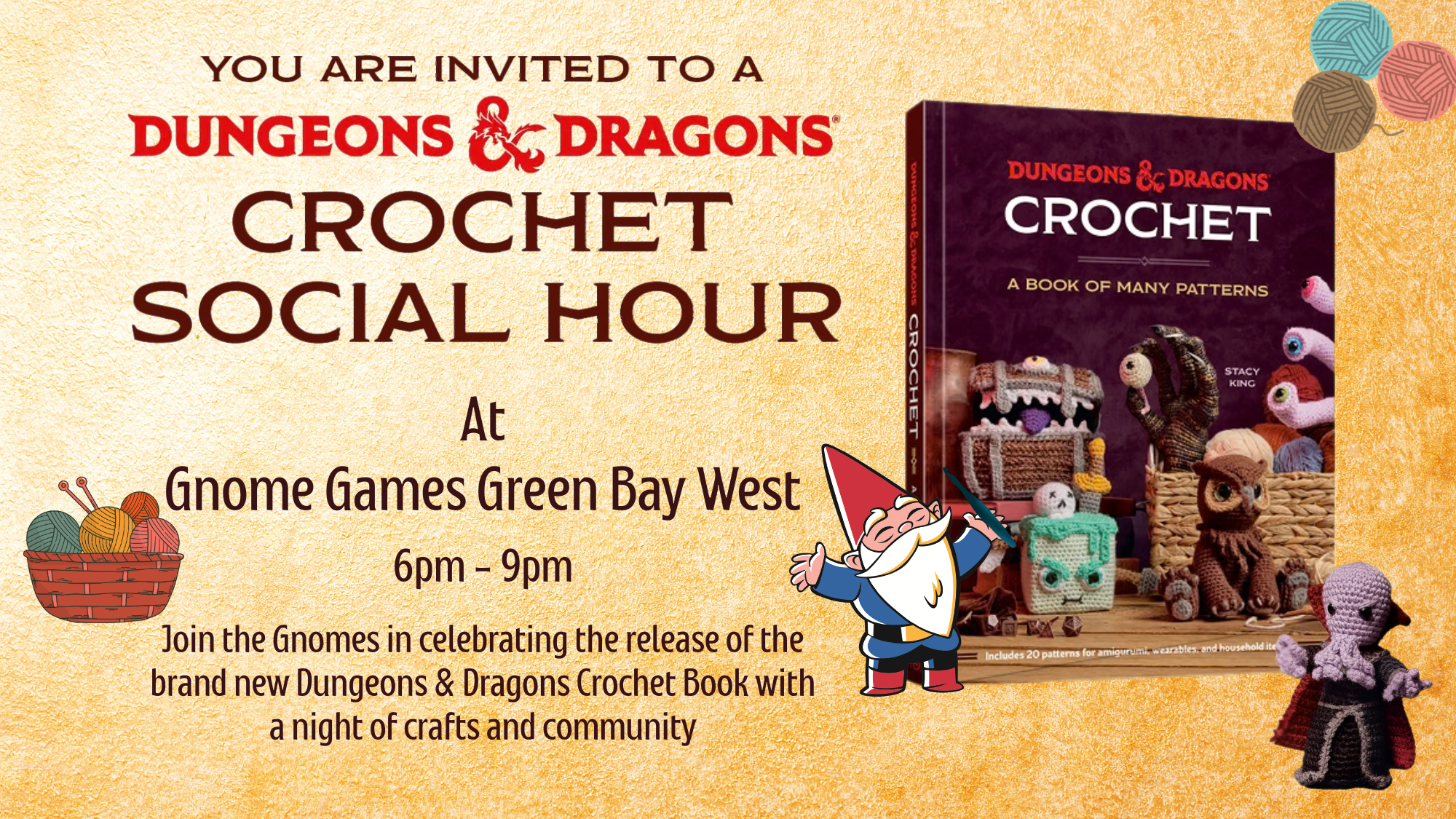
Join us at Gnome Games Green Bay West for our Dungeons & Dragons Crochet Social Hour event!
On Tuesday, March 31st from 6 PM to 9 PM, we’re hosting a special Crochet Social Hour event! Celebrate the release of the brand new Dungeons & Dragons Crochet Book at this one time event! Come in and crochet, chat and hang out with fellow D&D crafters. Anyone that pre-orders the book receives a School of Magic Granny Squares PDF, featuring 8 school-symbol designs that are beginner-friendly and endlessly customizable!
We’ll be taking pictures of people’s projects (if they’d like!) and posting them on social media. These photos have a chance to be featured on official D&D socials and newsletters! Social Hour is open to all skill levels, whether it’s your very first time crocheting or your 100th project. Crochet, learn, or simply discuss which school of magic you belong to with other fans!
For more information check: https://sites.prh.com/dnd-crochet-preorder-campaign/dnd-crochet-social-hour-events
Pre-order NOW in store for $29.99 + tax!
For more events at Gnome Games, check out our calendar!

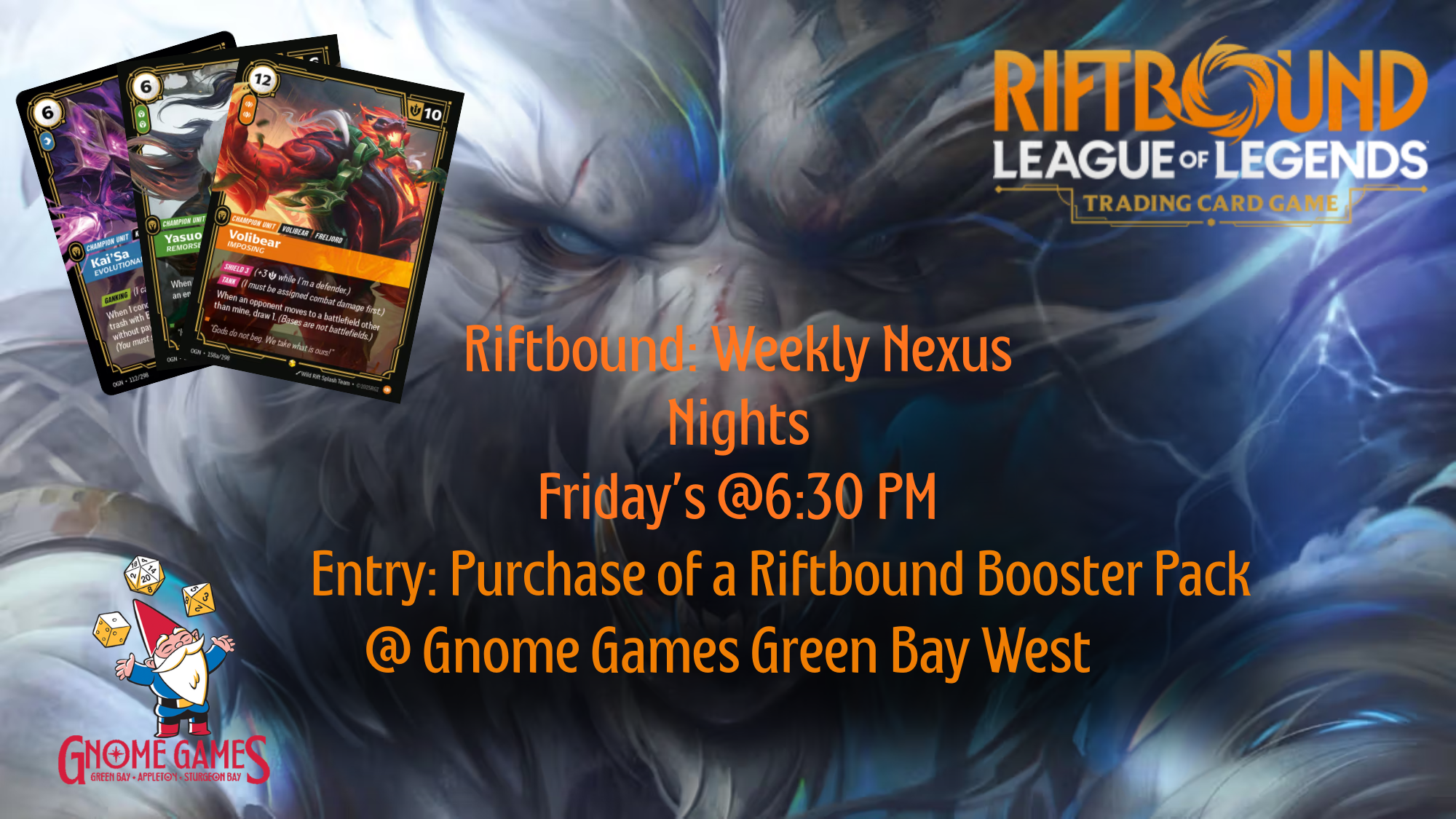
Join the Gnomes each Friday at 6:30pm for Riftbound’s Nexus Nights!
We’re inviting players out to play Riftbound in a variety of formats with a simple cost of purchasing a pack of Riftbound! Promos will go out based on attendance.
There are a multitude of formats available to play: 1 v 1, 2 v 2, or 3-4 player free for all! You’ll want to stay up to date with the most current errata or rules changes, some of which is available here: https://riftbound.leagueoflegends.com/en-us/news/rules-and-releases/riftbound-origins-card-errata/
If you’re looking for help building decks you might like information from the designers: https://riftbound.leagueoflegends.com/en-us/news/rules-and-releases/deckbuilding-primer/
The domains are:
- Fury (Red) –
- Fury is about aggression, passion, and the thrill of conquering.
- Fury decks often use damage-based removal, Accelerate (and other ways to enter ready), and rewards for conquering to achieve victory.
- Generally, Fury cards have a harder time drawing lots of cards or killing units directly, especially units that stay out of combat in their base.
- Examples of Fury from popular fiction are Conan the Barbarian, Blade, and Anakin Skywalker.
- Calm (Green) –
- Calm is about balance, meditation, and the peace of holding.
- Calm decks often use defensive tricks, moving enemies, and negating interaction (like counterspells and stuns) to defend their holds and achieve victory.
- Generally, Calm cards have a harder time being very aggressive or interacting without using their units.
- Examples of Calm from popular fiction are Gandalf, Baloo, and Obi Wan Kenobi.
- Mind (Blue) –
- Mind is about innovation, outsmarting opponents, and the benefits of intelligence and curiosity.
- Mind decks often use long-term planning, shrinking tricks, card draw, hidden and gear synergy to gain an advantage and achieve victory.
- Generally, Mind cards have a harder time with moving units or having efficient units.
- Examples of Mind from popular fiction are Sherlock Holmes, Curious George, and Yoda.
- Body (Orange) –
- Body is about physical superiority, agility, and connection to the wilds.
- Body decks often ramp their resources, play efficient and high impact units, and dominate combats to achieve victory.
- Generally, Body cards have a harder time with finding efficient card draw or noncombat spells.
- Examples of Body from popular fiction are The Terminator, Juggernaut, and Chewbacca.
- Chaos (Purple) –
- Chaos is about unpredictability, rebellion, and trickiness.
- Chaos decks often manipulate position and the trash, use hidden tricks, and filter toward the right cards to achieve victory.
- Generally, Chaos cards have a harder time permanently eliminating a threat or giving permanent advantages to its units.
- Examples of Chaos from popular fiction are V (for Vendetta), Spiderman, and Han Solo.
- Order (Yellow) –
- Order is about unity, community, and sacrifice for the greater good.
- Order decks often generate many small units, gain effects on unit death, and kill units directly to achieve victory.
- Generally, Order cards have a harder time dealing with smaller units and moving units.
- Examples of Order from popular fiction are Superman, Cobra Commander, and Leia Organa.
One way to start building a deck is to start with a domain you think fits your playstyle (or just style, generally) and search for cool cards you might want to fit into a deck.
Look for this and other events at our website: gnomegames.com/events/month!

Join the Gnomes each Friday at 6:30pm for Riftbound’s Nexus Nights!
We’re inviting players out to play Riftbound in a variety of formats with a simple cost of purchasing a pack of Riftbound! Promos will go out based on attendance.
There are a multitude of formats available to play: 1 v 1, 2 v 2, or 3-4 player free for all! You’ll want to stay up to date with the most current errata or rules changes, some of which is available here: https://riftbound.leagueoflegends.com/en-us/news/rules-and-releases/riftbound-origins-card-errata/
If you’re looking for help building decks you might like information from the designers: https://riftbound.leagueoflegends.com/en-us/news/rules-and-releases/deckbuilding-primer/
The domains are:
- Fury (Red) –
- Fury is about aggression, passion, and the thrill of conquering.
- Fury decks often use damage-based removal, Accelerate (and other ways to enter ready), and rewards for conquering to achieve victory.
- Generally, Fury cards have a harder time drawing lots of cards or killing units directly, especially units that stay out of combat in their base.
- Examples of Fury from popular fiction are Conan the Barbarian, Blade, and Anakin Skywalker.
- Calm (Green) –
- Calm is about balance, meditation, and the peace of holding.
- Calm decks often use defensive tricks, moving enemies, and negating interaction (like counterspells and stuns) to defend their holds and achieve victory.
- Generally, Calm cards have a harder time being very aggressive or interacting without using their units.
- Examples of Calm from popular fiction are Gandalf, Baloo, and Obi Wan Kenobi.
- Mind (Blue) –
- Mind is about innovation, outsmarting opponents, and the benefits of intelligence and curiosity.
- Mind decks often use long-term planning, shrinking tricks, card draw, hidden and gear synergy to gain an advantage and achieve victory.
- Generally, Mind cards have a harder time with moving units or having efficient units.
- Examples of Mind from popular fiction are Sherlock Holmes, Curious George, and Yoda.
- Body (Orange) –
- Body is about physical superiority, agility, and connection to the wilds.
- Body decks often ramp their resources, play efficient and high impact units, and dominate combats to achieve victory.
- Generally, Body cards have a harder time with finding efficient card draw or noncombat spells.
- Examples of Body from popular fiction are The Terminator, Juggernaut, and Chewbacca.
- Chaos (Purple) –
- Chaos is about unpredictability, rebellion, and trickiness.
- Chaos decks often manipulate position and the trash, use hidden tricks, and filter toward the right cards to achieve victory.
- Generally, Chaos cards have a harder time permanently eliminating a threat or giving permanent advantages to its units.
- Examples of Chaos from popular fiction are V (for Vendetta), Spiderman, and Han Solo.
- Order (Yellow) –
- Order is about unity, community, and sacrifice for the greater good.
- Order decks often generate many small units, gain effects on unit death, and kill units directly to achieve victory.
- Generally, Order cards have a harder time dealing with smaller units and moving units.
- Examples of Order from popular fiction are Superman, Cobra Commander, and Leia Organa.
One way to start building a deck is to start with a domain you think fits your playstyle (or just style, generally) and search for cool cards you might want to fit into a deck.
Look for this and other events at our website: gnomegames.com/events/month!

Join the Gnomes each Friday at 6:30pm for Riftbound’s Nexus Nights!
We’re inviting players out to play Riftbound in a variety of formats with a simple cost of purchasing a pack of Riftbound! Promos will go out based on attendance.
There are a multitude of formats available to play: 1 v 1, 2 v 2, or 3-4 player free for all! You’ll want to stay up to date with the most current errata or rules changes, some of which is available here: https://riftbound.leagueoflegends.com/en-us/news/rules-and-releases/riftbound-origins-card-errata/
If you’re looking for help building decks you might like information from the designers: https://riftbound.leagueoflegends.com/en-us/news/rules-and-releases/deckbuilding-primer/
The domains are:
- Fury (Red) –
- Fury is about aggression, passion, and the thrill of conquering.
- Fury decks often use damage-based removal, Accelerate (and other ways to enter ready), and rewards for conquering to achieve victory.
- Generally, Fury cards have a harder time drawing lots of cards or killing units directly, especially units that stay out of combat in their base.
- Examples of Fury from popular fiction are Conan the Barbarian, Blade, and Anakin Skywalker.
- Calm (Green) –
- Calm is about balance, meditation, and the peace of holding.
- Calm decks often use defensive tricks, moving enemies, and negating interaction (like counterspells and stuns) to defend their holds and achieve victory.
- Generally, Calm cards have a harder time being very aggressive or interacting without using their units.
- Examples of Calm from popular fiction are Gandalf, Baloo, and Obi Wan Kenobi.
- Mind (Blue) –
- Mind is about innovation, outsmarting opponents, and the benefits of intelligence and curiosity.
- Mind decks often use long-term planning, shrinking tricks, card draw, hidden and gear synergy to gain an advantage and achieve victory.
- Generally, Mind cards have a harder time with moving units or having efficient units.
- Examples of Mind from popular fiction are Sherlock Holmes, Curious George, and Yoda.
- Body (Orange) –
- Body is about physical superiority, agility, and connection to the wilds.
- Body decks often ramp their resources, play efficient and high impact units, and dominate combats to achieve victory.
- Generally, Body cards have a harder time with finding efficient card draw or noncombat spells.
- Examples of Body from popular fiction are The Terminator, Juggernaut, and Chewbacca.
- Chaos (Purple) –
- Chaos is about unpredictability, rebellion, and trickiness.
- Chaos decks often manipulate position and the trash, use hidden tricks, and filter toward the right cards to achieve victory.
- Generally, Chaos cards have a harder time permanently eliminating a threat or giving permanent advantages to its units.
- Examples of Chaos from popular fiction are V (for Vendetta), Spiderman, and Han Solo.
- Order (Yellow) –
- Order is about unity, community, and sacrifice for the greater good.
- Order decks often generate many small units, gain effects on unit death, and kill units directly to achieve victory.
- Generally, Order cards have a harder time dealing with smaller units and moving units.
- Examples of Order from popular fiction are Superman, Cobra Commander, and Leia Organa.
One way to start building a deck is to start with a domain you think fits your playstyle (or just style, generally) and search for cool cards you might want to fit into a deck.
Look for this and other events at our website: gnomegames.com/events/month!

Join the Gnomes each Friday at 6:30pm for Riftbound’s Nexus Nights!
We’re inviting players out to play Riftbound in a variety of formats with a simple cost of purchasing a pack of Riftbound! Promos will go out based on attendance.
There are a multitude of formats available to play: 1 v 1, 2 v 2, or 3-4 player free for all! You’ll want to stay up to date with the most current errata or rules changes, some of which is available here: https://riftbound.leagueoflegends.com/en-us/news/rules-and-releases/riftbound-origins-card-errata/
If you’re looking for help building decks you might like information from the designers: https://riftbound.leagueoflegends.com/en-us/news/rules-and-releases/deckbuilding-primer/
The domains are:
- Fury (Red) –
- Fury is about aggression, passion, and the thrill of conquering.
- Fury decks often use damage-based removal, Accelerate (and other ways to enter ready), and rewards for conquering to achieve victory.
- Generally, Fury cards have a harder time drawing lots of cards or killing units directly, especially units that stay out of combat in their base.
- Examples of Fury from popular fiction are Conan the Barbarian, Blade, and Anakin Skywalker.
- Calm (Green) –
- Calm is about balance, meditation, and the peace of holding.
- Calm decks often use defensive tricks, moving enemies, and negating interaction (like counterspells and stuns) to defend their holds and achieve victory.
- Generally, Calm cards have a harder time being very aggressive or interacting without using their units.
- Examples of Calm from popular fiction are Gandalf, Baloo, and Obi Wan Kenobi.
- Mind (Blue) –
- Mind is about innovation, outsmarting opponents, and the benefits of intelligence and curiosity.
- Mind decks often use long-term planning, shrinking tricks, card draw, hidden and gear synergy to gain an advantage and achieve victory.
- Generally, Mind cards have a harder time with moving units or having efficient units.
- Examples of Mind from popular fiction are Sherlock Holmes, Curious George, and Yoda.
- Body (Orange) –
- Body is about physical superiority, agility, and connection to the wilds.
- Body decks often ramp their resources, play efficient and high impact units, and dominate combats to achieve victory.
- Generally, Body cards have a harder time with finding efficient card draw or noncombat spells.
- Examples of Body from popular fiction are The Terminator, Juggernaut, and Chewbacca.
- Chaos (Purple) –
- Chaos is about unpredictability, rebellion, and trickiness.
- Chaos decks often manipulate position and the trash, use hidden tricks, and filter toward the right cards to achieve victory.
- Generally, Chaos cards have a harder time permanently eliminating a threat or giving permanent advantages to its units.
- Examples of Chaos from popular fiction are V (for Vendetta), Spiderman, and Han Solo.
- Order (Yellow) –
- Order is about unity, community, and sacrifice for the greater good.
- Order decks often generate many small units, gain effects on unit death, and kill units directly to achieve victory.
- Generally, Order cards have a harder time dealing with smaller units and moving units.
- Examples of Order from popular fiction are Superman, Cobra Commander, and Leia Organa.
One way to start building a deck is to start with a domain you think fits your playstyle (or just style, generally) and search for cool cards you might want to fit into a deck.
Look for this and other events at our website: gnomegames.com/events/month!
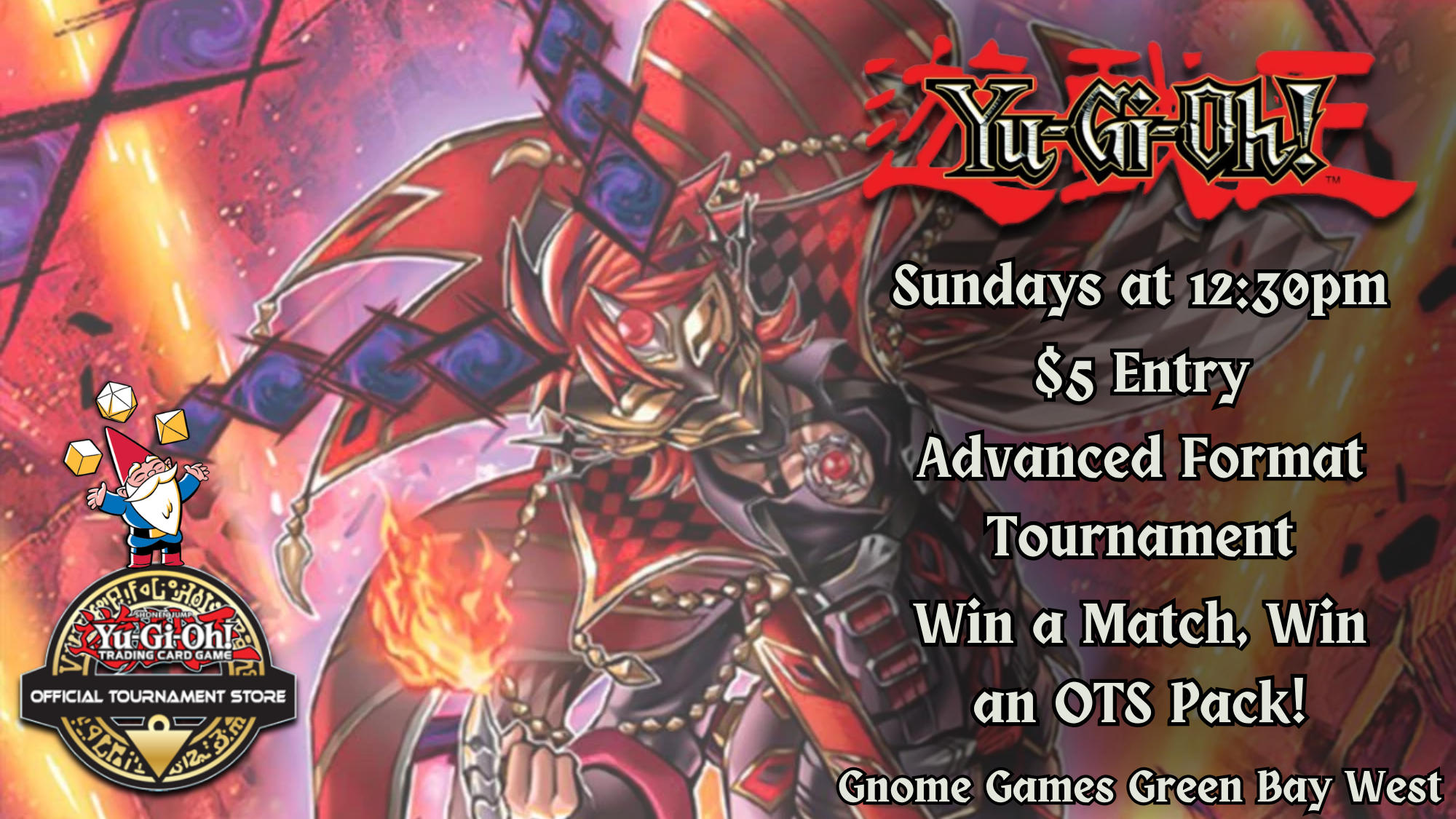
It’s time to d-d-d-duel!!!
It’s a Sunday fun-day tournament!
Advanced Format. 3 rounds win a match win an OTS pack. If you haven’t received an OTS pack by the end of the event, you get one for coming and playing!

 Join the Gnomes on Saturdays at 12:30pm for a Riftbound Nexus Tournament!
Join the Gnomes on Saturdays at 12:30pm for a Riftbound Nexus Tournament!


